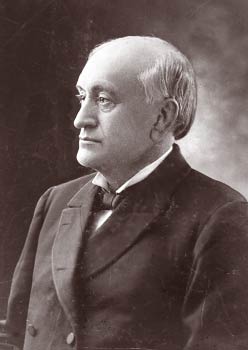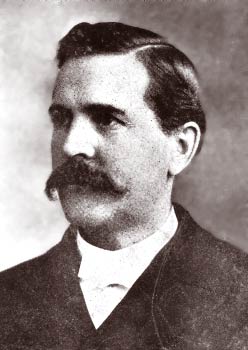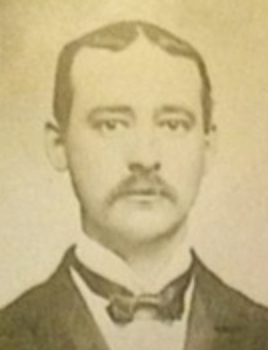
Hiram F. Reynolds (1854-1938) was a minister and general superintendent in the Church of the Nazarene.

Hiram F. Reynolds (1854-1938) was a minister and general superintendent in the Church of the Nazarene.
Reynolds was born 1854 in Lyons, Illinois. [1] He was converted at age twenty-two and began preaching the following year in the Methodist church in New England. Reynolds was ordained deacon in the Vermont Conference by Methodist Episcopal Bishop Andrews in 1884, and was ordained elder in 1886 by Methodist Episcopal Bishop John Fletcher Hurst. [2] [3] In 1895, Dr. Reynolds joined the Association of Pentecostal Churches of America. He was elected Home and Foreign Missionary Secretary two years later. When the Association merged with the Church of the Nazarene to form the Pentecostal Church of the Nazarene in 1907, Reynolds was elected general superintendent along with Phineas F. Bresee. Re-elected the following year during the Second General Assembly at Pilot Point, he continued in that office until his retirement in 1932. During most of his superintendency, he also served as Secretary for Foreign Missions and in 1896 began the ambitious program of Christian witness to the Cape Verde Islands. Reynolds was also a founder, influential in the naming, of The Eastern Nazarene College. [4]
A bishop is an ordained member of the clergy who is entrusted with a position of authority and oversight in a religious institution.
The Methodist Episcopal Church (MEC) was the oldest and largest Methodist denomination in the United States from its founding in 1784 until 1939. It was also the first religious denomination in the US to organize itself nationally. In 1939, the MEC reunited with two breakaway Methodist denominations to form the Methodist Church. In 1968, the Methodist Church merged with the Evangelical United Brethren Church to form the United Methodist Church.

The Church of the Nazarene is a Christian denomination that emerged in North America from the 19th-century Wesleyan-Holiness movement within Methodism. It is headquartered in Lenexa, Kansas. With its members commonly referred to as Nazarenes, it is the largest denomination in the world aligned with the Wesleyan-Holiness movement and is a member of the World Methodist Council.

John William Hamilton was an American bishop of the Methodist Episcopal Church, elected in 1900. He was the chancellor of American University from 1916 until 1922. He was the older brother of Franklin Elmer Ellsworth Hamilton, who was also both a Methodist Bishop and the Chancellor of American University.

Phineas F. Bresee was the primary founder of the Church of the Nazarene, and founding president of Point Loma Nazarene University.
The Right Reverend is an honorific style given to certain religious figures and members of a clergy.

James Mills Thoburn was an American bishop of the Methodist Episcopal Church as well as an author. He did missionary work in India.

George Foster Pierce (1811–1884) was an American bishop of the Methodist Episcopal Church, South who served as the first president of Wesleyan College and was also president of Emory University.
A bishop is a senior role in many Methodist denominations. The bishop's role is typically called the "episcopacy", based on the Greek word episkopos (επισκοπος), which literally means overseer. Superintendent is another translation of episkopos but in Methodist churches this is a role distinct from bishop. The first Methodist bishops were appointed in America, and American Methodist denominations still recognize the office of bishop.
General Superintendent is the highest elected office within the Church of the Nazarene. General Superintendents are elected by the General Assembly of the denomination for a four-year term to expire at the end of the next General Assembly.
Roy Hunter Short was an American bishop of The Methodist Church and the United Methodist Church, elected in 1948.
Albert Frederick "Fritz" Mutti, III is a retired American bishop of the United Methodist Church, elected in 1992.
Raymond LeRoy Archer, was an American bishop of The Methodist Church. He was elected in 1950.
William Walter Peele was an American bishop of the Methodist Episcopal Church, South, and The Methodist Church, elected to said office in 1938. He also gained notability as a college professor, a pastor, and as the president of the Council of Bishops of his denomination. Bishop Peele was one of the last eight bishops elected by the M.E. Church, South.

Fred A. Hillery was an early leader in the American Holiness Movement; the founding president of the South Providence Holiness Association; the founding pastor of the People's Evangelical Church, the "mother church of the Church of the Nazarene in the East"; a co-founder of the Central Evangelical Holiness Association and also of the Association of Pentecostal Churches of America; one of the founders of the Pentecostal Collegiate Institute ; one of the founding fathers of the Church of the Nazarene; and the publisher of holiness periodicals and books.
The Philippines Central Conference of the United Methodist Church is a collection of annual conferences of the United Methodist Church in the Philippines that are organised much like jurisdictional conferences in the United States. The Philippines Central Conference is considered a member church of the World Methodist Council, and a "Central Conference" of the world-wide United Methodist Church. It is also a member of the Christian Conference of Asia and the National Council of Churches in the Philippines as The United Methodist Church in the Philippines, representing the denomination as its Philippine counterpart.
The history of the Church of the Nazarene has been divided into seven overlapping periods by the staff of the Nazarene archives in Lenexa, Kansas: (1) Parent Denominations (1887–1907); (2) Consolidation (1896–1915); (3) Search for Solid Foundations (1911–1928); (4) Persistence Amid Adversity (1928–1945); (5) Mid-Century Crusade for Souls (1945–1960); (6) Toward the Post-War Evangelical Mainstream (1960–1980); and (7) Internationalization (1976-2003).

Lyman C. Pettit was the founder and first president of the Pentecostal Collegiate Institute ; the founding pastor of both the Congregational Methodist Church of Saratoga Springs, and the First People's Church of Brooklyn, New York; and an ordained clergyman who was the pastor of churches in the Methodist Episcopal Church, the Association of Pentecostal Churches of America, and the Presbyterian Church in the United States of America.
The Pentecostal Collegiate Institute was a short-lived co-educational collegiate institute operated initially by the Association of Pentecostal Churches of America at Saratoga Springs, New York from September 1900 to May 1902, and from then by Lyman C. Pettit until its closure in February 1903. It is considered an antecedent institution of the Pentecostal Collegiate Institute and also Eastern Nazarene College.

The Pentecostal Collegiate Institute was a co-educational interdenominational collegiate institute located at North Scituate, Rhode Island from September 1902 to 1918. PCI was incorporated in Rhode Island and operated by its own board in association with the Association of Pentecostal Churches of America. The Church of the Nazarene operated it after 1915. It is considered a predecessor to Eastern Nazarene College.